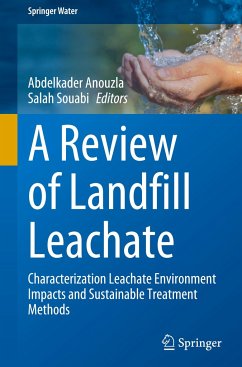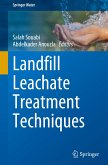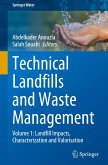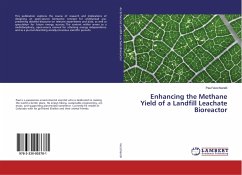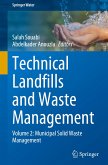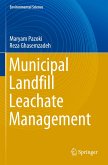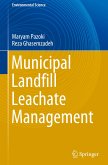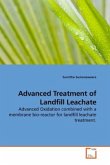Solid waste landfilling and related environmental issues have become global concerns, particularly in developing countries. Accelerating population growth and changing lifestyles have exacerbated health and environmental challenges.
This book looks at the global ramifications of leachate characterization and environmental impacts, highlighting the different issues related to landfilling, such as leachate generation and its constituents. When water enters a landfill, it assimilates the dissolved components of the decomposing waste, thus forming a leachate with considerable impacts on the environment. The nature of the landfill and the waste received (household waste alone or mixed with industrial waste) determine whether the leachate produced is hazardous or not. The decomposition of solid waste in landfills goes through several stages, including an initial aerobic phase, an anaerobic acid phase, an initial methanogenic phase and a stable methanogenic phase. Leachates can contain significant concentrations of heavy metals, inorganic salts, ammonia, halogenated hydrocarbons, suspended matter, organic pollutants in significant quantities... Generally, leachate discharges are rich in phenol, highly toxic polluting ammonium. Ecotoxicological assessment of this effluent is essential to determine the impact of its contaminants on the aquatic ecosystem. If pollutants are not disposed of properly, leachate from landfills can potentially enter soils and subsoils, severely contaminating surface and groundwater bodies.
Therefore, reducing pollutant levels through leachate treatment has garnered considerable attention in recent decades. This publication is an invaluable resource, providing up-to-date information on the impact and characterization of leachate landfills. It is therefore time to accentuate the training of executives with all the skills to facilitate the waste management through the research efforts of academics, in the field of solid wastelandfill operations.
This book looks at the global ramifications of leachate characterization and environmental impacts, highlighting the different issues related to landfilling, such as leachate generation and its constituents. When water enters a landfill, it assimilates the dissolved components of the decomposing waste, thus forming a leachate with considerable impacts on the environment. The nature of the landfill and the waste received (household waste alone or mixed with industrial waste) determine whether the leachate produced is hazardous or not. The decomposition of solid waste in landfills goes through several stages, including an initial aerobic phase, an anaerobic acid phase, an initial methanogenic phase and a stable methanogenic phase. Leachates can contain significant concentrations of heavy metals, inorganic salts, ammonia, halogenated hydrocarbons, suspended matter, organic pollutants in significant quantities... Generally, leachate discharges are rich in phenol, highly toxic polluting ammonium. Ecotoxicological assessment of this effluent is essential to determine the impact of its contaminants on the aquatic ecosystem. If pollutants are not disposed of properly, leachate from landfills can potentially enter soils and subsoils, severely contaminating surface and groundwater bodies.
Therefore, reducing pollutant levels through leachate treatment has garnered considerable attention in recent decades. This publication is an invaluable resource, providing up-to-date information on the impact and characterization of leachate landfills. It is therefore time to accentuate the training of executives with all the skills to facilitate the waste management through the research efforts of academics, in the field of solid wastelandfill operations.

